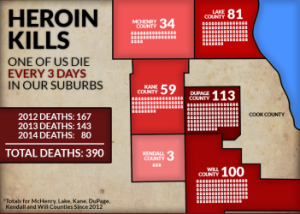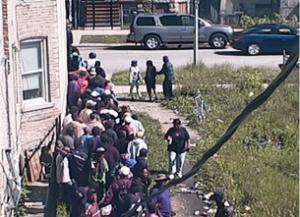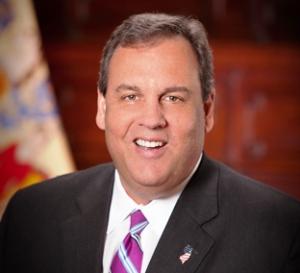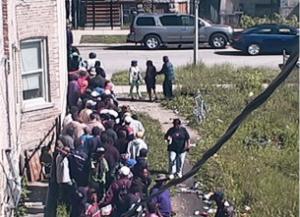Illinois's Republican governor has vetoed an comprehensive heroin bill because he doesn't want Medicaid to have to pay for treatment. But there appear to be enough votes to override the veto.
California still has some problems with the feds, dispensaries open in Nevada and get licensed in Illinois, an Oklahoma initiative campaign is gearing up, and more.
More jail guards in trouble, a DEA agent gets popped for child porn, and a Mississippi cop gets fired after getting caught in a major marijuana deal.
Asset forfeiture reform is moving in Michigan, Texas is about to end its ban on food stamps for drug felons, Brazil's high court takes up a case that could lead to drug decriminalization, the Teamsters and other labor groups pan hair drug testing, and more.
A Wisconsin tribe moves toward legal marijuana, Oakland's effort to back the Harborside dispensary gets shot down in federal court, Peru wants to shoot down drug planes, both major Kentucky governor candidates want to drug test welfare recipients, and more.
Pot isn't stinky enough for its odor to automatically qualify as disorderly conduct in Oregon, Colorado patients sue over the state's decision not to include PTSD in the medical marijuana program, Oklahomans will try again to get a medical marijuana initiative on the ballot, and more.
Another South Florida community moves toward marijuana decrimin, GOP primary state voters want the feds to stay out of state marijuana policies, DC's top prosecutor hints at drug decriminalization, Illinois's governor vetoes Medicaid heroin treatment funding, and more.
We're still waiting for the big one to drop in California, Ohio officials don't play nice with initiative ballot title language, Illinois gets its first dispensary approved, NYC wants to ban "fake weed,' and more.
Faced with a public health crisis related to heroin and prescription opioid use, the Illinois state government created a bipartisan Heroin Task Force in a comprehensive effort to address the problem from all angles. The task force created a set of policy recommendations that were embodied in House Bill 1, the Heroin Crisis Act.

Heroin is taking a toll not only in Chicago, but in its suburbs. (kirk.senate.gov)
But saying, "People are dying," the measure's House sponsor, Rep. Lou Lang (D-Skokie), has vowed an effort to override the veto. An override could be within reach -- the bill passed by veto-proof majorities in both houses -- but for members of a governor's own party, a veto override is a hard vote to take.
Here's what the bill does:
- It increases the availability of opiate overdose reversal drugs and requires private insurance to cover at least one of them, as well as acute treatment and stabilization services. It allows licensed pharmacists to dispense overdose reversal drugs, allows school nurses to administer them to students suffering from overdoses, and provides protection from civil liability for people who administer them in good faith.
- It requires the Department of Human Services and the State Board of Education to develop a three-year pilot heroin prevention program for all schools in the state, requires the Department of Human Services to develop materials to educate prescription opiate users on the dangers of those drugs, and it requires the Department of Insurance to convene working groups on drug treatment and mental illness and on parity between state and federal mental health laws.
- It intensifies the state's prescription monitoring program by tightening reporting requirements and it requires doctors to now document the medical necessity of any three sequential 30-day prescriptions for Schedule II opioids.
- On the criminal justice front, it permits multiple chances at drug court and prevents prosecutors from unilaterally blocking entry to drug court, and it requires prosecutors and public defenders to undergo mandatory education on addiction and addiction treatment. It also increases criminal penalties for "doctor shopping" if fraud is involved.
- It requires Medicaid coverage of all heroin treatment, including methadone and other opiate maintenance treatment, as well as all anti-overdose medications.

People lining up to buy heroin in Chicago. (Chicago PD)
It's the latter provision to which
Rauner objects.
"I support all of the above measures and applaud the multifaceted approach to combating this epidemic in Illinois. Unfortunately, the bill also includes provisions that will impose a very costly mandate on the State's Medicaid providers. I am returning the bill with a recommendation to address that concern," he said in a veto statement.
"House Bill 1 mandates that fee-for-service and medical assistance Medicaid programs cover all forms of medication assisted treatment of alcohol or opioid dependence, and it removes utilization controls and prior authorization requirements," Rauner continued. "These changes would limit our ability to contain rising costs at a time when the State is facing unprecedented fiscal difficulties. Importantly, the State's Medicaid programs already cover multiple forms of medication necessary to treat alcohol and opioid dependence. But without adequate funding to support mandated coverage for all forms of treatment, regardless of cost, this change would add to the State's deficit."
His recommendation is simply to delete the language requiring Medicaid coverage.
Rep. Lang and other bill supporters aren't going for that.
"There's a human cost to not doing it," Lang said. "People are addicted, people are sick, people are dying. You want to talk about the costs of providing methadone and
Narcan to addicts, but you forget totally that if you cure them or they get off the stuff, there's a savings to the Medicaid system on a different line item, because they're no longer in emergency rooms, they're no longer a burden to law enforcement."
Heroin and opiate addiction is a serious problem in Illinois. The rate of drug overdose deaths has nearly doubled since 1999, and in the Chicago suburbs, people have been dying of drug overdoses at a rate of three per day since 2012. In the state as a whole, 633 people died of heroin overdoses last year, with nearly half (283) in Chicago.
At the same time as the problem with heroin and prescription opioids has been deepening, the state's ability to provide treatment has been decreasing. According to a report this month from the Illinois Consortium on Drug Policy, the state's ranking for drug treatment capacity has fallen from 28th in the nation in 2009 to 47th this year. This as demand for heroin and opiate treatment statewide is increasing dramatically. In Chicago and the surrounding suburbs, 35% of drug treatment admissions are for heroin, more than twice the national average.
The consortium's director and the study's lead author, Kathleen Kane-Willis, noted that Illinois is one of only a few states nationwide that doesn't allow Medicaid coverage of opiate maintenance treatment.
"We're going to pay for not paying," she said.
But bill supporters could also find the votes to override the veto. Rep. Lang says that is what's he going to try to do, and with a 114-0 vote in the House and a 46-6 vote in the Senate the first time around, he has plenty of supporters to ask. If that happens, Illinois will get the drug treatment it needs, and Rauner will still be able to maintain his fiscally conservative credentials.
back to top
California still has some problems with the feds, dispensaries open in Nevada and get licensed in Illinois, an Oklahoma initiative campaign is gearing up, and more.
CaliforniaLast Thursday, a federal appeals court rejected Oakland's lawsuit backing the Harborside dispensary. The 9th US Circuit Court of Appeals has upheld a lower court ruling dismissing Oakland's lawsuit against the Justice Department and the Northern California US Attorney's office. The city had argued that closing the dispensary would deprive it of tax revenues and increase crime by creating a black market for marijuana. Then US Attorney Melinda Haag moved in 2012 to seize Harborside, claiming it violated federal law by selling medical marijuana. The case continues even though the Justice Department has since said it generally wouldn't interfere with state marijuana laws.
Last Friday, the Marin Alliance for Medical Marijuana sought relief in federal court from a permanent civil injunction barring it from operating. Dispensary founder Lynnette Shaw cited last December's passage of the Rorhabacher-Farr amendment, which bars the Justice Department from interfering with state medical marijuana laws, in filing the motion for relief.
Colorado
Last Thursday, Colorado patients sued over the state's refusal to include PTSD as a qualifying condition. Five PTSD patients filed suit against the state Board of Health over its decision not to include PTSD on the state's medical marijuana eligibility list. The board and the Department of Public Health and Environment, which is also named in the complaint, now have 21 days to respond.
Illinois
On Tuesday, the state issued its first dispensary license. The state Department of Financial and Professional Regulations has granted a dispensary license to the Harbory in Marion. Another dispensary is under construction in Milan, but has yet to be licensed. There will be more to come. "Illinois medical cannabis dispensaries will continue to be registered on a rolling basis," said the DFPR in a statement. "Illinois medical cannabis dispensaries will receive medical cannabis exclusively from Illinois' licensed growing facilities once it becomes available."
Michigan
On Monday, one group planning a legalization initiative said it would instead focus on medical marijuana. The Michigan Responsibility Council, which had been considering running a third legalization initiative campaign in the state, has decided to instead focus on an initiative aimed at improving the state's medical marijuana law. Two other groups are continuing with their marijuana legalization efforts.
Nevada
On Monday, the first Las Vegas dispensary opened for business. A spokesman for Euphoria Wellness said Thursday the dispensary had won final state and county approvals this week and would open for business Monday. It will be the first dispensary in Clark County. The first dispensary in the state opened last month in the Reno suburb of Sparks.
On Wednesday, Reno's first dispensary opened for business. Sierra Wellness Connections opened near downtown Reno. It is the first one in the city and the third one in the state. One in nearby Sparks opened earlier this month, and one in Las Vegas opened Monday.
Oklahoma
Oklahoma Medical Marijuana Initiative Coming. Medical marijuana advocates filed papers with the state last Friday indicating they are preparing another initiative petition drive to put the issue before the voters. Once the initiative is approved for circulation, proponents will have 90 days to gather 123,000 valid voter signatures to qualify for the November 2016 ballot. A similar effort fell short in 2014. This one is being run by a group called Green the Vote.
[For extensive information about the medical marijuana debate, presented in a neutral format, visit MedicalMarijuana.ProCon.org.]
back to top
More jail guards in trouble, a DEA agent gets popped for child porn, and a Mississippi cop gets fired after getting caught in a major marijuana deal. Let's get to it:
In Hattiesburg, Mississippi, a Hattiesburg police officer was fired last Wednesday amid allegations he is a target of a state and federal drug investigation. Officer Thomas Wheeler got canned after he was caught making a 600-pound marijuana deal earlier this month. Wheeler has yet to be charged, and his case will likely go before a grand jury in October.In McAllen, Texas, a DEA special agent was arrested last Friday on child porn charges. Special Agent James Patrick Burke had been the subject of a February raid in which FBI agents seized his laptop and discovered he was viewing and downloading child pornography. It's not clear exactly what he's been charged with, but he's now on administrative leave from the DEA.
In Mobile, Alabama, a Mobile County jail guard was arrested Tuesday for allegedly selling drugs. David John Black Jr. is charged with four counts of distribution of marijuana, possession of marijuana, and possession of drug paraphernalia. The Mobile County Sheriff's Office said there was no evidence he was dealing drugs at the jail.
In Memphis, four Shelby County jail deputies pleaded guilty last Thursday to trying to smuggle prescription drugs into the jail. Torriano Vaughn, Brian Grammer, Anthony Thomas and Marcus Green had participated in a scheme to smuggle what they thought were OxyContin pills into Shelby County Jail on multiple occasions between May and December 2014. But it was a sting, and the four have now pleaded guilty to attempted possession of a controlled substance with the intent to distribute. They're looking at up to 20 years.
back to top
Asset forfeiture reform is moving in Michigan, Texas is about to end its ban on food stamps for drug felons, Brazil's high court takes up a case that could lead to drug decriminalization, the Teamsters and other labor groups pan hair drug testing, and more.

Truckers and other labor groups are urging the House to reject hair drug testing. (wikimedia/Veronica538)
Ohio Chamber of Commerce Joins Opposition to Legalization Initiative. The Ohio Chamber of Commerce said Wednesday it would "strongly oppose" the ResponsibleOhio legalization initiative and will donate $100,000 to defeat it at the polls. The chamber cited worries over workplace safety. The initiative campaign said it was not surprised, given that chambers of commerce in other states where legalization has been an issue have always opposed it.
Asset Forfeiture
Michigan Asset Forfeiture Reform Package Wins Senate Panel Vote. The Senate Judiciary Committee Wednesday approved a package of bills reforming civil asset forfeiture. House Bills 4499 and 4503-4506 all passed unanimously. Five of the bills increase reporting requirements for law enforcement agencies, while two bills would raise standards in drug and public nuisance forfeiture cases from "a preponderance of evidence" to "clear and convincing evidence." The committee did not vote on House Bill 4508, which would have barred the seizure of vehicles used to purchase less than an ounce of marijuana, after committee lawyers said it would legalize marijuana.
Drug Policy
Texas to End Ban on Food Stamps for Drug Felons. Beginning September 1, Texas becomes the latest state to opt out of a federal ban on food stamps for drug felons that was enacted as part of the 1996 federal welfare reform bill. Many states opted out immediately, and now only a handful maintain the ban. They are Alaska, Georgia, Mississippi, South Carolina, West Virginia and Wyoming.
Drug Testing
Teamsters, Other Unions Urge House to Reject Hair Testing. A coalition of labor groups has sent a letter to House lawmakers dealing with transportation issues asking them to reject a recent Senate proposal to let trucking companies use hair testing for drugs instead of urine testing. The Senate proposal is part of a six-year highway bill. "We urge the Transportation and Infrastructure Committee to reject efforts to allow hair to be used for federal drug tests before the validity and reliability of this testing method can be determined by the Department of Health and Human Services, the groups, including the Teamsters and a branch of the AFL-CIO, wrote. Urine testing, which detects recent drug use, has "proven effective," the groups said. Hair drug testing detects drug use going back months.
Harm Reduction
Third Indiana County Gets Emergency Needle Exchanges. The state health commissioner has declared a public health emergency in Fayette County because of high levels of Hepatitis C infections. That will allow the county to institute needle exchange programs. Similar emergencies were declared earlier this year in Scott and Madison counties.
International
Brazil Supreme Court Considering Case That Could Lead to Drug Decriminalization. On Wednesday, the country's high court began arguing the case of a prison inmate caught with three grams of marijuana and charged with drug possession. Sao Paulo state public defenders are pushing for the conviction to be overturned on the grounds that the charge is unconstitutional because it violated citizens' privacy rights. The judges are continuing to consider the case today, with a ruling expected shortly.
New Canada Poll Has Two-Thirds for Marijuana Decriminalization. A new Ipsos poll has 65% of Canadians favoring decriminalization, with 35% opposed. "Doesn't matter where you live in the country, a majority of every demographic group supports decriminalization," said pollster Sean Simpson. Support was at 39% in 1987 and increased steadily since then.
back to top
A Wisconsin tribe moves toward legal marijuana, Oakland's effort to back the Harborside dispensary gets shot down in federal court, Peru wants to shoot down drug planes again, both major Kentucky governor candidates want to drug test welfare recipients, and more.

Peru claims a ton a day of cocaine is being flown out of the country. (gob.es)
California NAACP Files Legalization Initiative. The civil rights group has filed the Community Act to Regulate, Control and Tax Cannabis, the latest addition to the growing list of legalization initiatives filed in the state. Reports are that the initiative is not designed to compete with the still long-awaited proposal from ReformCA, of which the California NAACP is a member, but to submit model language in support of the broader effort. The initiative would legalize up to an ounce and allow personal grows of up to 25 square feet, as well as allow marijuana commerce.
Wisconsin's Menominee Tribe Votes to Legalize Marijuana on Reservation. Tribal members overwhelmingly approved two advisory questions on whether the tribe should legalize marijuana on its reservation. Recreational marijuana was approved 677 to 499, while medical marijuana was approved 899 to 275. The matter now goes to the tribal legislature, which, given the vote, will likely approve ordinances allowing for marijuana.
Medical Marijuana
Federal Appeals Court Rejects City of Oakland Lawsuit Backing Harborside Dispensary. The 9th US Circuit Court of Appeals has upheld a lower court ruling dismissing Oakland's lawsuit against the Justice Department and the Northern California US Attorney's office. The city had argued that closing the dispensary would deprive it of tax revenues and increase crime by creating a black market for marijuana. Then-US Attorney Melinda Haag moved in 2012 to seize Harborside, claiming it violated federal law by selling medical marijuana. The case continues even though the Justice Department has since said it generally wouldn't interfere with state marijuana laws.
First Las Vegas Dispensary Set to Open Monday. A spokesman for Euphoria Wellness said Thursday the dispensary had won final state and county approvals this week and would open for business Monday. It will be the first dispensary in Clark County. The first dispensary in the state opened last month in the Reno suburb of Sparks.
Drug Testing
Both Major Kentucky Gubernatorial Candidates Want to Do Welfare Drug Testing. Democratic Attorney General Jack Conway has joined Republican gubernatorial nominee Matt Bevin in calling for drug testing of some welfare recipients. "I don't want to see our tax dollars going to support drug addiction," Conway, the Democratic front-runner, said Thursday. But Conway called for suspicion-based drug testing, while Bevins called for random testing, and Conway rejects drug testing Medicare recipients, while Bevins is for it.
International
Peruvian Congress Approves Shooting Down Suspected Drug Planes. The Congress voted unanimously Thursday to allow military planes to shoot down suspected drug flights. Drug-fighting President Ollanta Humala is expected to sign the bill. Peru claims a ton of cocaine a day is flown to Bolivia. Peru used to shoot down drug planes, but stopped after one of its pilots in a CIA-run program shot down a small plane carrying US missionaries, killing US citizen Roni Bowers and her infant daughter, Charity.
Russia Threatens to Ban Wikipedia Over Drug "How To" Entry. Russia's online censor, Roskomnadzor, says it will ban the entire website from Russia unless it removes or blocks access to an article about how to make a marijuana preparation. The censor has also recently gone after Reddit and YouTube over similar postings. Click on the link for more.
Canada's NDP Would Decriminalize Marijuana "Right Away." New Democratic Party leader Thomas Mulcair said Thursday that "the NDP's position is decriminalization the moment we form a government" and that "it's something we can do right away." The NDP is leading most polls in the elections set for October. The Liberals under Justin Trudeau have called for outright legalization, but they're polling third, behind the Conservatives, who have taken a hard line opposing any moves at drug liberalization.
Dusseldorf Moves Forward on Legal Marijuana Sales Plan. Councilors in the German city Wednesday approved a pilot project to sell marijuana to adults. The move was a joint effort by the three parties that form the city's governing coalition, the Social Democrats, the Free Democrats, and the Greens. A similar move is afoot in Berlin, Germany's largest city, where councilors in the Friedrichshain-Kreuzberg district applied for a marijuana license in June.
(This article was prepared by StoptheDrugWar.org's lobbying arm, Drug Reform Coordination Network, which also pays the cost of maintaining this web site. DRCNet Foundation takes no positions on candidates for public office, in compliance with section 501(c)(3) of the Internal Revenue Code, and does not pay for reporting that could be interpreted or misinterpreted as doing so.)
back to top
Pot isn't stinky enough for its odor to automatically qualify as disorderly conduct in Oregon, Colorado patients sue over the state's decision not to include PTSD in the medical marijuana program, Oklahomans will try again to get a medical marijuana initiative on the ballot, and more.

Chris Christie tries to make political hay off of opiate addiction. (nj.gov)
Oregon Court Rules Pot Smell Not Inherently Offensive. The state Court of Appeals has thrown out the conviction of a man arrested on graffiti charges after police entered his home using the premise that he was committing disorderly conduct with the "physically offensive" odor of smoked marijuana. The court held that marijuana odors are not necessarily "physically offensive," writing that, "We are not prepared to declare that the odor of marijuana smoke is equivalent to the odor of garbage. Indeed, some people undoubtedly find the scent pleasing." The case is State v. Lang.
Medical Marijuana
Colorado Patients Sue Over State's Refusal to Include PTSD as Qualifying Condition. Five PTSD patients filed suit against the state Board of Health last Thursday over its decision not to include PTSD on the state's medical marijuana eligibility list. The board and the Department of Public Health and Environment, which is also named in the complaint, now have 21 days to respond.
Oklahoma Medical Marijuana Initiative Coming. Medical marijuana advocates filed papers with the state last Friday indicating they are preparing another initiative petition drive to put the issue before the voters. Once the initiative is approved for circulation, proponents will have 90 days to gather 123,000 valid voter signatures to qualify for the November 2016 ballot. A similar effort fell short in 2014. This one is being run by a group called Green the Vote.
Drug Policy
Chris Christie Campaign Ad Blames Heroin "Epidemic" on Obama. In a new campaign ad, the New Jersey governor and Republican presidential contender goes after "lawlessness in America and around the world under Barack Obama" and declares that "drugs are running rampant and destroying lives" as images of an apparent drug overdose and a hoodie-wearing addict shooting up show on the screen. Christie doubled down on the ad on MSNBC's Morning Joe this morning: "This president has set a standard in Washington of lawlessness," he said. "What I mean by that is this: If you don't like the law, don't enforce it. So if you don't like the immigration laws, don't enforce those and let there be sanctuary cities throughout the country and do nothing about it. If you don't like the marijuana laws, don't enforce the marijuana laws in certain states if they don't feel like enforcing them."
Ohio Bill Would End Automatic Drivers' License Suspension for Drug Offenses. Following an edict developed by the federal government in the 1990s, people convicted of drug offenses in Ohio face an automatic six-month suspension of their drivers' licenses, even if no vehicle was involved in their offense. The state told the federal government in December it wanted out of the program, and now a bill to do just that, Senate Bill 204, has been introduced. The bill would make the suspension discretionary instead of mandatory, and it has the support of state prosecutors. "It never made much sense to have a license suspension in connection with a drug offense unless there is a vehicle involved," said John Murphy of the Ohio Prosecuting Attorneys Association.
International
May Shootout in Mexico Now Looks Like a Massacre By Police. The Mexican National Security Commission told the public that an incident that left 42 alleged cartel gunmen and one police officer dead was an hours-long shootout, but evidence developed since then suggest that it was instead a massacre or summary execution of suspects. Now, the Mexican Attorney General's Office and local prosecutors in Michoacan say crime scene evidence doesn't match what the commission and the police reported. That evidence suggests that only 12 of the 42 dead narcos were killed in action. Twenty-three others had wounds consistent not with a gunfight, but with an execution. Federal police said they seized 43 firearms, but only 12 had been fired, and photographs of the scene showed bodies with muddy hands lying next to clean weapons. One victim was shot nine times in the back; another was beaten to death. The Attorney General's Office says it will take over the investigation once local investigators are done.
(This article was prepared by StoptheDrugWar.org's lobbying arm, the Drug Reform Coordination Network, which also pays the cost of maintaining this web site. DRCNet Foundation takes no positions on candidates for public office, in compliance with section 501(c)(3) of the Internal Revenue Code, and does not pay for reporting that could be interpreted or misinterpreted as doing so.)
back to top
Another South Florida community moves toward marijuana decrim, GOP primary state voters want the feds to stay out of state marijuana policies, DC's top prosecutor hints at drug decrim, Illinois's governor vetoes Medicaid heroin treatment funding, and more.

Heroin users lining up to score in Chicago. The governor has vetoed heroin treatment funding. (Chicago PD)
Poll: GOP Voters in Early Primary States Want Feds to Butt Out on Marijuana. Roughly two-thirds of Republican voters in Iowa and New Hampshire says states should be able to design their own marijuana laws without federal interference. The figure was 64% in Iowa and 67% in New Hampshire. The poll was conducted by Public Policy Polling and was commissioned by Marijuana Majority. "We put these polls into the field because we want presidential candidates to understand that the voters in these key states -- who they need support from to win -- overwhelmingly want the next occupant of the Oval Office to scale back federal marijuana prohibition," said Tom Angell, chairman of Marijuana Majority.
Key West Latest South Florida City to Move Toward Decriminalization. Officials in Key West have given preliminary approval to municipal marijuana decriminalization; a final vote will come next month. The change comes on the heels of similar moves this summer in Miami-Dade County, Miami Beach, and Hallandale Beach. Lawmakers in Palm Beach County are now considering a similar proposal, as are lawmakers up the Gulf Coast in St. Petersburg.
Medical Marijuana
Michigan Group Drops Legalization Initiative Plans; Will Instead Focus on Medical Marijuana Reforms. The Michigan Responsibility Council, which had been considering running a third legalization initiative campaign in the state, has decided to instead focus on an initiative aimed at improving the state's medical marijuana law. Two other groups are continuing with legalization efforts.
Reno's First Dispensary Opens Wednesday. Sierra Wellness Connections opens near downtown Reno tomorrow. It is the first one in the city and the third one in the state. One in nearby Sparks opened earlier this month, and one in Las Vegas opened Monday.
Drug Policy
DC's Attorney General Hints He Could Support Drug Decriminalization. DC Attorney General Karl Racine responded to a caller who argued that drug prohibition created the recent wave of new psychoactive substance use during a C-Span interview last Friday by largely agreeing with him. "Law enforcement and over-criminalization of drug laws can cause more harm to society than benefit… With respect to the legalization of other substances, including marijuana, I think the caller makes an excellent point… I think that the 21st Century policing is such that smart prosecution means less of an emphasis on criminalizing conduct, more of an emphasis on mental health and substance abuse. With respect to marijuana, you know, my position is very clear. I think it should be legal and I think that the District of Columbia, like the State of Colorado should be able to regulate it."
Heroin and Opiates
Illinois Governor Cuts Drug Treatment Funding From Heroin Bill. Gov. Bruce Rauner (R) has partially vetoed a bill aimed at fighting heroin addiction and overdoses, cutting out a section that requires Medicaid coverage of all heroin treatment programs, as well as anti-overdose and heroin-treatment medications (methadone). Rauner said that he supports the efforts, but the state can't afford to pay for them. Bill supporters say the move is short-sighted, pennywise but pound-foolish, and that there is a real human cost to it. They also said they would fight to see the funding restored. The bill is House Bill 1.
International
Russian Censor Lifts Ban On Wikipedia for Marijuana Page. Russia's Internet censor, Roskomnadzor, said Tuesday it had lifted a ban on Russian-language Wikipedia after Wikipedia complied with a court order and edited an entry dealing with charas, a substance made from marijuana resins. Under Russian law, if a web site is banned via court order, as was the case here, the entire website is banned even if the offending material is only on one page. Russian Wikipedia was shut down for about 24 hours.
back to top
We're still waiting for the big one to drop in California, Ohio officials don't play nice with initiative ballot title language, Illinois gets its first dispensary approved, NYC wants to ban "fake weed,' and more.

The long-awaited ReformCA initiative is late out of the gate, but should be coming soon. (reformca.com)
Big California Legalization Initiative Nearly Ready. It's getting late in the season, and the ReformCA legalization initiative has yet to be rolled out. ReformCA chair Dale Sky Jones says it is coming next month, but the delay is cutting into signature-gathering time and is keeping funding on the sidelines for now. Click on the link for more details.
Ohio Secretary of State Uses "Monopoly" to Describe Legalization Initiative in Ballot Title. Secretary of State Jon Husted (R) has inserted the word "monopoly" into the title of the ResponsibleOhio legalization initiative, now known as Issue 3. The title voters will see when they cast their votes will be "Grants a monopoly for the commercial production and sale of marijuana for recreational and medicinal purposes." The initiative would give exclusive rights to grow marijuana commercially to 10 growing facilities whose owners are the funders of the initiative. But ResponsibleOhio counters that state regulators could later expand the number of sites.
Medical Marijuana
Illinois Issues First Dispensary License. The state Department of Financial and Professional Regulations has granted a dispensary license to the Harbory in Marion. Another dispensary is under construction in Milan, but has yet to be licensed. There will be more to come. "Illinois medical cannabis dispensaries will continue to be registered on a rolling basis," said the DFPR in a statement. "Illinois medical cannabis dispensaries will receive medical cannabis exclusively from Illinois' licensed growing facilities once it becomes available."
New Psychoactive Substances
Bill Would Ban "Synthetic Marijuana" in New York City. City Council Speaker Melissa Mark-Viverito said Tuesday she will file a bill to ban the sale of synthetic cannabinoids in the city. "This is a concern that's growing. We're trying to get a handle on it," she said at a news conference. Under the bill, people found guilty of selling the substance could face up to a year in jail and a $5,000 fine, with the fine increasing to $25,000 for subsequent violations. City officials have reported violent incidents and hospital ER visits linked to the drug.
International
British Tories Forego Debate to Reject Marijuana Legalization Petition. The British government is rejecting out of hand a petition calling for legalization that garnered more than 200,000 signatures on a new government website. The petition is supposed to require the parliament to consider the question, but the Tories control the backbenches, and the government isn't waiting to dash cold water on the idea. Its official reply says: "Substantial scientific evidence shows cannabis is a harmful drug that can damage human health. There are no plans to legalize cannabis as it would not address the harm to individuals and communities. Cannabis can unquestionably cause harm to individuals and society. Legalization of cannabis would not eliminate the crime committed by the illicit trade, nor would it address the harms associated with drug dependence and the misery that this can cause to families."
Salvia Divinorum To Be Banned in Canada as of February. On February 8, 2016, the fast-acting psychedelic will officially be added to Schedule IV of the Controlled Drugs and Substances Act. "The (CDSA) will prohibit activities such as the trafficking, possession for the purpose of trafficking, importation, exportation, possession for the purpose of exportation, and production, of Salvia Divinorum, its preparations, and derivatives, unless authorized by regulation or via an exemption," Health Canada said. Simple possession will not be prohibited by law.
back to top








